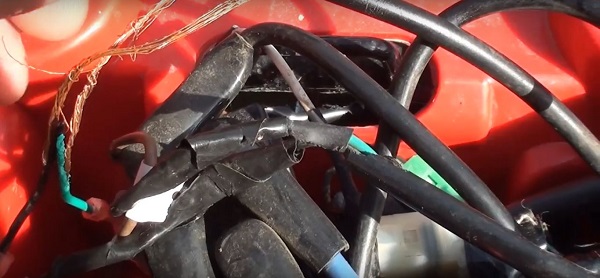According to earthkind.com, as much as eight percent U.S. house fires are caused by rodents chewing on electrical
wiring, causing a short, which can cause a spark, setting debris alight.

There are three basic reasons why mice chew on wires: their continually growing teeth; widening of a hole for access; and
use of wire insulation for nesting materials.
Mouse incisors experience continual growth. Because of this, mice are constantly gnawing to wear down their teeth and prevent over-
growth that would render them unable to eat. With a hard core and soft insulation, wires are an ideal medium for this purpose.
Inside your home’s walls, holes are drilled through lumber supports to allow wires to be threaded horizontally across the interior
width of a wall. Mice may need to widen these holes in order to fit through on their travels through your house. So mice chew on the
wire’s insulation in order to widen the space.
Wire insulation for electrical wiring and television cables, is constructed of paper, tightly wound around the wires with an outer plastic
coating. These materials are ideal for mice to create nests.
Unfortunately, if allowed to continue, sooner or later, the wiring itself will be exposed, leading to short circuits, dead wires and an increased
chance of fire. It would be a good idea to check your homeowner’s insurance policy for coverage of fires caused by rodents, because many policies do not.
Modern wiring insulation materials are manufactured to be less attractive to rodents. But to be safest, an electrician can enclose exposed wiring
that runs across attics inside metal conduits. These are metal tubes that are impervious to mice.
Rodents also sometimes chew on car wires. If a vehicle is parked outside for an extended period of time, mice can find their way in to the engine
compartment and cause havoc. To mice, a parked car could be an ideal place to nest.
To prevent an infestation, if possible, keep the car in a garage when not in use. Check the engine regularly and look for nesting material. And run the
car from time to time, moving it to a different location.
So the answer to the question, “Do mice chew on wires?” is that mice love to chew on wires. It helps them control tooth growth; it helps them gain access
through wiring runs across interior walls, and wiring insulation is a source of nesting materials.
In order to prevent serious wiring problems from mice, hire a professional to seal access points to the property and to exterminate any mice already living
inside the house. Hire an electrician to evaluate any existing damage to wiring in the attic and to install metal conduit for wires crossing attic spaces.
Aside from impacting your electrical systems, mice are known to carry many types of diseases, spoil food, and can cause extensive property damage. Eliminating
mice from your property and denying them future access will result in a safer and healthier home.
Go back to the
How to get rid of mice in the attic home page. You might also want to read about
how to kill mice and why the use
of snap traps is better than
mouse poison. Read an analysis of the different types of traps and how to use them on the
how to trap mice page.
Learn why
bait is not as important as trap type, placement and location. Also read a full analysis of
mouse repellent to understand why it
never works. If you see droppings and want to identify them, read the
mouse poop page. If you need to hire professional help, read about
how much does mouse removal cost?
or you can read this site to learn how to do it yourself. Feel free to email me about Why Mice Chew on Wires